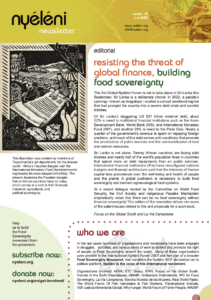19/06/2025
Under: Asia/World, Food Sovereignty and Agroecology, Publications
The 3rd Global Nyéléni Forum is set to take place in Sri Lanka this September. Sri Lanka is a deliberate choice: in 2022, a people’s uprising—known as Aragalaya—ousted a corrupt neoliberal regime that had plunged the country into a severe debt crisis and societal distress.
Of Sri Lanka’s staggering US $57 billion external debt, about 32% is owed to multilateral financial institutions such as the Asian Development Bank, World Bank (WB), and International Monetary Fund (IMF), and another 28% is owed to the Paris Club. Nearly a quarter of the government’s revenue is spent on repaying foreign creditors, and much of this debt comes with conditions that promote the privatization of public services and the commodification of land and natural resources.
Sri Lanka is not alone. Twenty African countries are facing debt distress and nearly half of the world’s population lives in countries that spend more on debt repayments than on public services. International financial institutions (IFIs) have reconfigured national budgets and financial architecture such that the interests of finance capital take precedence over the well-being and health of people and the planet. A global pushback is necessary to build food sovereignty and resilient agroecological food systems.
At a recent dialogue hosted by the Committee on World Food Security, the Civil Society and Indigenous Peoples’ Mechanism emphatically noted that there can be no food sovereignty without financial sovereignty! This edition of the newsletter delves into some of the salient issues related to this and proposals for a push-back.
Focus on the Global South and La Via Campesina
Click here to download the English edition (pdf)
Read also in






